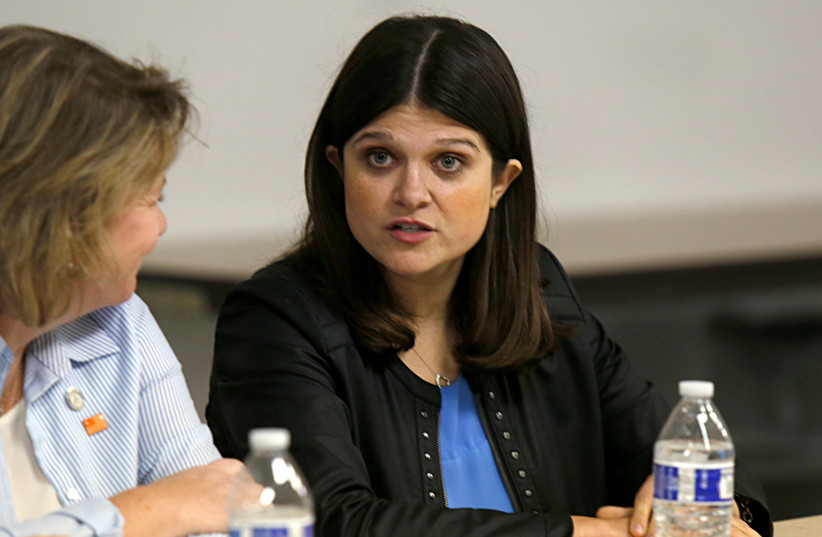WASHINGTON – AIPAC surprised political observers in December when it announced the establishment of two new PACs that would allow the pro-Israel lobby to directly fund political campaigns.
AIPAC had avoided directly entering the campaign arena for 70 years, which enabled it to balance relationships with both sides of the aisle. The new initiative sparked an immediate debate between those who said it was the only way for AIPAC to remain influential in a hyper-partisan Washington and those who said it would force the group to choose sides in races between Republicans and Democrats, which would harm its bipartisan nature.
What do the experts think?
Tom Dine, head of AIPAC from 1980-1993, said in March that the old policy of not endorsing candidates worked and called on the organization not to pursue its plan to fund campaigns directly.

“AIPAC’s new policy is a public failure. Under such circumstances, the challenge is to correct the policy and return immediately to the no endorsement rule, and fold up the political action committees immediately, returning the money to the donors. Failure has no place in the US-Israel relationship.”
Tom Dine, the head of AIPAC from 1980-1993
Yet the group pushed back on the criticism, saying that throughout its history it had to adjust its political strategy to ensure it could remain successful in an ever-changing Washington.
“The DC political environment has been undergoing profound change,” AIPAC president Betsy Korn wrote in a letter when announcing the move. “Hyper-partisanship, high congressional turnover, and the exponential growth in the cost of campaigns now dominate the landscape. As such, the Board has decided to introduce these two new [PACs].”
The group then invested heavily in several key races, including Michigan’s 11th district, where two Democratic incumbents ran against each other after the state lost a seat in the last census and the map was redrawn.
AIPAC PAC contributed $5,000 and $676,924 in direct contributions to Rep. Haley Stevens through its portal, and an additional $4.2 million through United Democracy Project, an AIPAC-linked super-PAC.
The J Street Action Fund, according to vice president of communications Logan Bayroff, spent more than $700,000 to help reelect Rep. Andy Levin. More than $300,000 was directly contributed to his campaign via JStreet PAC.
While the two groups had already backed candidates who ran against each other in this election, the race between moderate Stevens and progressive Levin became the center of attention this primary season, and a contentious race between AIPAC and J Street, which traded barbs and condemned each other’s tactics.
What did the victory mean?
Following the Stevens victory, AIPAC was quick to celebrate a “major victory for Pro-Israel Candidate,” while J Street decried AIPAC’s “overwhelming spending,” charging that the group “hopes to send an intimidating message to others: cross our red lines, and you could be next.”
But what does Tuesday’s election victory mean for AIPAC’s new strategy?
“It is by no means clear that the huge amount of money that AIPAC spent supporting Stevens is the primary reason why she won the primary,” said Prof. Dov Waxman, director of the UCLA Y&S Nazarian Center for Israel Studies. “She was, after all, the incumbent in that district, and she also received support from other PACs. We shouldn’t jump to the conclusion that AIPAC determined the outcome of the race. Nor should we only focus on AIPAC’s spending and criticize it for doing what other lobby groups and PACs have long done. AIPAC’s actions are not unprecedented, unfair or unlawful. The problem is not AIPAC specifically, but the excessive role of money, particularly ‘dark money,’ spent by super PACs in American elections. It’s a bigger problem affecting American democracy.
“AIPAC’s largely successful intervention in Democratic primaries in this election clearly demonstrates the group’s power to help politicians it deems to be pro-Israel, and hurt those deemed to be anti-Israel or just insufficiently pro-Israel. Besides wielding this power more blatantly and directly – through its own PAC and super PAC – there’s nothing really new about this. What is new, however, is that by targeting Andy Levin, a popular Jewish congressman who is a liberal Zionist and avowedly pro-Israel and opposed to BDS, AIPAC is aggressively trying to enforce its own understanding of what being ‘pro-Israel’ means.
“By demonstrating its ability to help elect ‘pro-Israel’ congressional candidates and defeat those whom it considers to be too critical of Israel, AIPAC will certainly retain, if not enhance, its influence in Washington, and among Democrats in Congress in particular.
“But it risks paying a price with Democratic voters, especially progressives, who resent the group’s heavy-handed tactics, its narrow definition of what it means to be ‘pro-Israel,’ and that it’s spending large sums of money from Republican donors in Democratic primaries.”
According to AIPAC spokesman Marshall Wittmann, the PACs have achieved “extraordinary results in a short period of time. In just six months, AIPAC PAC has established itself as the largest pro-Israel political action committee and has made a critical difference supporting successful pro-Israel candidates. Our PACs have been enthusiastically embraced by our membership, evidenced by our ability to directly support nearly 340 candidates and use the PAC portal to deliver millions of dollars raised by AIPAC members in support of candidates. Our PACs are also standing with pro-Israel progressive candidates because support for Israel is entirely consistent with progressive values. Bottom line: our political activity is demonstrating that being pro-Israel is good policy and good politics.”
“It risks paying a price with Democratic voters, especially progressives, who resent the group's heavy-handed tactics, its narrow definition of what it means to be 'pro-Israel,' and the fact that it's spending large sums of money from Republican donors in Democratic primaries.”
Professor Dov Waxman, Director of the UCLA Y&S Nazarian Center for Israel Studies
